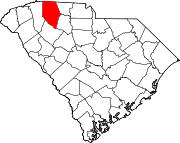|
Inman, South Carolina
Inman is a city in Spartanburg County, South Carolina, United States, part of the Spartanburg metropolitan area. With a population of 3,665 at the 2020 census, Inman residents have access to nearby Lake Bowen that affords water recreational sports and fishing, and Inman is accessible by Interstate 26 and Interstate 85. The city contains a historic main street district, several houses of worship, and a school district. HistoryInman was incorporated by South Carolina on December 22, 1882 at the crossroads of Howard Gap and Blackstock.[6][1] William Gowan, a local landowner, founded the town by volunteering to build a railroad depot which convinced the railroad to create a stop at the city. Since there was already a town named Gowansville, some local historians have said town was named after the president of the railroad or a surveyor[7] However, according to geographer Henry Gannett, the town was named after a local resident.[8] The town emerged as a small settlement, with businesses such as a blacksmith, a bank, and even a barber shop springing up around the depot. During the 1930s Inman was considered the fresh peach capital of the world.[6] The Bush House and Shiloh Methodist Church are listed on the National Register of Historic Places.[9] In 1901, James A. Chapman founded Inman Mills, a company that still spins and weaves fabric. The mill was designed by W.B. Smith Whaley and was one of the city's major employers for many years.[10] The original mill was closed in 2001 and listed on the National Register of Historic Places in 2016. The building has been converted into apartments.[11] In 1935, a local man named Bryson Hammet found a large stone off South Carolina highway 292 with various markings and the year 1567 carved into it.[12] Historians have debated the authenticity and meaning of the stone for decades with many attributing the stone to Spanish Explorer and gold seeker Captain Juan Pardo.[13] GeographyInman is located at 35°2′51″N 82°5′25″W / 35.04750°N 82.09028°W (35.047493, -82.090329).[14] The city lies just north of Spartanburg, and a few miles south of the North Carolina-South Carolina border. The city's historic district lies along South Carolina Highway 292 just north of its intersection with U.S. Route 176 (which passes along the southwestern edge of the city). SC 292 also connects Inman with Interstate 26 to the east. Inman Mills, an unincorporated community, lies immediately southwest of Inman. According to the United States Census Bureau, the city has a total area of 0.9 square miles (2.3 km2), all land. ClimateInman is located in the Upstate region of South Carolina. The weather is temperate year-round, due to its location in the Isothermal Belt, a phenomenon that results when warmer air on the western side of the Appalachian Mountains blows over the mountains, leaving a 60-mile-wide (97 km) trough where significant temperature inversions of 20 degrees Fahrenheit or greater can occur.[15]  Demographics
2020 census
As of the 2020 United States census, there were 2,990 people, 1,141 households, and 604 families residing in the city with the median household income of $51,210. The median property value was $106,000, and the homeownership rate was 62%. Most people commuted by driving alone, with an average commute time of 20.5 minutes, and households owned an average of two cars. EducationLocal schools in Inman include Inman Elementary, Inman Intermediate, Mabry Middle School, and Chapman High School. Inman has a lending library, a branch of the Spartanburg County Public Library.[18] Notable people
References
External linksWikimedia Commons has media related to Inman, South Carolina. |
|||||||||||||||||||||||||||||||||||||||||||||||||||||||||||||||||||||||||||||||||||||||||||||||||||||||||||||||||||||||||||||||||||||||||||




